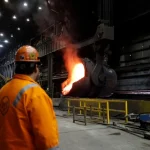
While much of the world has eyes on Israel’s battles with Hezbollah and Hamas, the U.S. Navy has its sights set on another of Iran’s proxies, the Yemeni Houthi rebels.
With a mission to keep international waterways at peace, the Navy now finds itself fending off attacks from the shadowy gang of pirates who have gone from arming themselves with assault rifles, pickup trucks and motorboats – to a seemingly unending supply of drones, missiles and other weaponry.
The Houthis often attack unarmed Western ships carrying goods through the Red Sea and the Gulf of Aden – while the U.S. has responded in kind with drone attacks on Yemen.
ISRAELI AIR FORCE STRIKES HOUTHI TARGETS IN YEMEN WITH ‘EXTENSIVE’ OPERATION
That’s led to perilous waters along a trade route that typically sees some $1 trillion in goods pass through it, as well as shipments of aid to war-torn Sudan and the Yemeni people.
And as the attacks continue, some experts argue the U.S. response has not been strong enough to deter the Houthis from inflicting billions of dollars worth of damage to the global economy.
“The U.S. response has been ineffective,” Can Kasapoglu, a Turkey-based Hudson Institute fellow who specializes in Middle East political-military affairs, told Fox News Digital.
“We have very limited intelligence about [the Houthis] and they are in a different part of the world, in a distant corner of the Middle East. But that corner also happens to be right next to a choke point on global trade… The Houthis are the most daring of the Iranian proxy network. And the U.S. has never gone into a preemptive phase where they target the Houthi leadership.”
IRAN WARNS OF ‘DECISIVE RESPONSE’ IF ISRAEL CROSSES ‘RED LINES’
The U.S. has responded to attacks with air and missile defense efforts, drone and missile interceptions – only engaging the Houthis once an attack is imminent, said Kasapoglu.
“We never saw a high-yield targeted killing campaign by the United States. For instance, Israel killed [Hezbollah leader] Hassan Nasrallah. Or just like Israel went after, for instance, the higher, high-level Iranian Revolutionary Guards generals, so this is what is missing – the U.S. acting against critical leadership.”
In addition to destroying goods destined for the West, the regular Houthi attacks drive up insurance costs: premiums for some shot up tenfold. They force some ships to travel the long way – down around the Horn of Africa, which can add $1 million in fuel costs for a round trip.
“They are launching relatively low-cost weapon systems, and inflicting major economic damage on the West on behalf of Iran. This is a very lucrative business,” said Kasapoglu.
One argument for restraint could be the cost of action: Houthi drones are estimated to cost a few thousand dollars each. The Naval missiles the U.S. fires back at them can run around $2 million per shot.
Houthi attacks ramped up after Hamas’ Oct. 7 terrorist attack on Israel, targeting 80 merchant vessels with missiles and drones over the past year.
They’ve seized one vessel and sunk two and killed a total of four sailors. A U.S.-led series of airstrikes in May killed at least 16 people, the rebels said.
BIDEN ADMIN NEEDS ‘MORE AGGRESSIVE’ PLAN TO TAKE ON HOUTHIS
On Tuesday, the rebel group claimed it shot down a multimillion-dollar, U.S.-made MQ-9 Reaper drone flying near Yemen. The U.S. acknowledged losing one of the drones, which costs around $30 million apiece.
In January, the Iran-backed militias killed three U.S. service members and injured 40 others in an attack on a U.S. base in Jordan. The U.S. responded forcefully to that attack with a barrage of airstrikes on 85 targets across Iraq and Syria.
“That response proved to be effective, and I think that we could do more of that certainly – take that approach,” said retired Lt. Gen. Mark Schwartz, former security coordinator of the Israel-Palestinian Authority.
Since the Houthis seized the country’s north and its capital of Sanaa in 2014, the U.S. military has seen Reapers shot down in Yemen in 2017, 2019, 2023 and 2024. The U.S. military acknowledged the Houthis shot down two MQ-9s in September.
The Houthis also continue to launch missiles targeting Israel. In response, Israel Defense Forces launched aggressive retaliatory strikes in Yemen’s key port city of Hodeida.
The rebels have maintained that they target ships linked to Israel, the U.S. or the U.K. to force an end to Israel’s campaign in Gaza against Hamas. But many of the ships they attack have little connection to the conflict – some were even bound for Iran.
BIDEN SAYS HE WOULD NOT BACK ISRAELI STRIKE ON IRAN’S NUCLEAR SITES
Last month, they attacked the Greek-flagged oil tanker Sounion, which was carrying 1 million barrels of oil in the Red Sea.
And last week, Houthi rebels fired half a dozen ballistic missiles, anti-ship cruise missiles and two drones at three U.S. ships traveling through the Bab el-Mandeb Strait. All were intercepted by Navy destroyers, a U.S. official said Friday.
“This gets resolved when we finish our dealings with Iran, whatever that looks like in the long term,” said Seth Krummrich, a retired Army colonel and former chief of staff at Special Operations Command Central (SOCCENT).
Sources say the U.S. lacks a will to put boots on the ground to fight the Houthis. Central to the Biden administration’s global strategy is a concern over escalating tensions that could lead to a full-scale confrontation with Iran – a nation that, by many estimates, is only weeks away from having the capability to build a nuclear bomb.
“The Israelis have the will to fight the Houthis, but they have limited capability, and they’re also engaged with two wars going on right now, so it necessitates American intervention if the West really wants to stop them,” said Kasapoglu.
US FORCES DESTROY HOUTHI WEAPONS
“Avoiding escalation is an obsession right now. It is a psychological case, not a political case. And it is imprisoning American military capabilities.”
Krummrich argued that the Pentagon “has been staring at the Houthi problem long enough to understand that there is a limit to what you’re going to be able to do without putting boots on the ground.”
“That would be like a giant sponge. It can absorb an endless amount of our resources,” he said. “But the Houthis are also smart. They launch and then retreat quickly… if they stay outside of our rules of engagement, they will be less likely to be struck.”
But others say there is more to be done that does not amount to ground forces.
“Yemen has proven time and time again that they’re willing to absorb a lot of lethal activity from the U.S. and the coalition and still attack vessels, still attack Israel,” said Schwartz.
“There’s this fear of escalation, doing something that’s so provocative that we’re going to have a broader war. Yemen is at war with the United States from their perspective, right? Just like Lebanese Hezbollah is at war and has been with Israel, and the same with Hamas prior to Oct. 7.”
“We overestimate our concern in terms of a broadening conflict, because at the end of the day, the Houthis in particular, they’re not a viable military force,” Schwartz went on.
“We could be much more aggressive in terms of our military response to the Houthis and find an overwhelming response that falls well short of getting the U.S. mired in some type of major conflict.”







